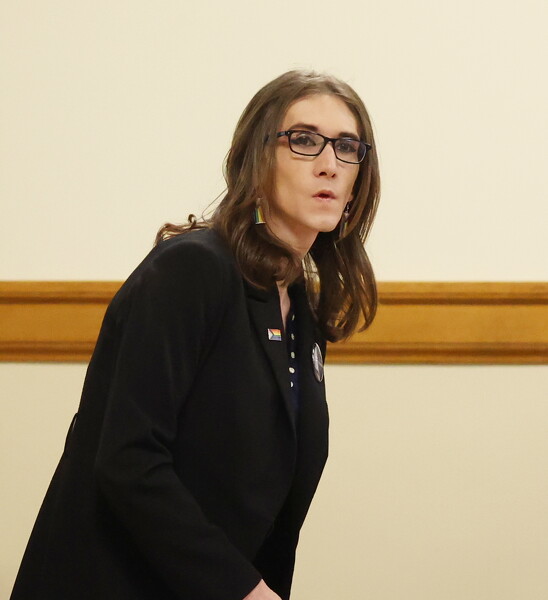
By William Kincaid
Arienne Childrey is running for Ohio’s 84th House District seat.
CELINA – A St. Marys transgender woman running for Ohio’s 84th House District seat will remain on the March 19 Democratic primary election ballot after a challenge to her candidacy was dismissed on Thursday morning.
Mercer County Board of Elections members unanimously voted to invalidate Mercer County Republican Party Chairman Robert Hibner’s protest against Arienne Childrey’s candidacy.
Immediately following that action, board member Del Kramer asked if anyone on the board wished to decertify any candidate. No one spoke up and Kramer adjourned the meeting, which lasted less than three minutes.
Childrey, who was surrounded by supporters, was elated with the outcome of the meeting.
“I am very pleased with the ruling and this frees us up to continue fighting for the people of the 84th District, which is exactly what we’re going to do,” Childrey told the newspaper afterward.
Thursday’s meeting was scheduled to “hear an update on the status of a protest and to determine if the board will revisit the candidate’s certification.”
Board members last month certified Childrey’s petition. Childrey was the lone Democrat to file to run for the seat currently held by State Rep. Angie King, R-Celina. The district covers all of Mercer County, southern Auglaize County and northern Darke County.
Hibner on Jan. 5 submitted a letter of protest to the board of elections office, claiming Childrey has been known by at least one other name in the past year but did not list any other names on her petition.
An Ohio law, unfamiliar even to many state elections officials, mandates that candidates disclose any name changes in the past five years on their petition paperwork, with exemptions for changes caused by marriage. But the law isn’t listed in the 33-page candidate requirement guide and there is no space on the petition paperwork to list any former names.
“In fact, had I know of this provision and tried to comply – which I certainly would’ve – my legal name and deadname simply could not have fit in the space provided on the candidacy documents,” Childrey said in a news release.
A deadname is a term used by the transgender community to refer to the name given at birth, not one they chose that aligns with their gender identity.
Board of elections directors Deb Sneddon and Kristi Rable on Jan. 9 determined Hibner’s protest was invalid, according to county assistant prosecutor Amy Ikerd, who had noted that a protest against a candidate must be filed by a person of the same party.
Additionally, Sneddon and Rable had reached out to Hibner, who reportedly confirmed he did not intend to change his party affiliation from Republican to Democrat as part of his protest, Ikerd said.
“And that made his protest invalid because of the Ohio law for this type of election going into a primary, the protest has to be from somebody of the same party,” Ikerd said on Thursday morning. “At that point, it’s invalid.”
Still, Ikerd asked board members at the meeting to take a formal vote on the protest.
“I’m not aware of anybody planning to challenge that but if they were then they would need a final order from the board,” Ikerd had explained. “So I would ask that the board confirm that invalidation so that we have a motion and a decision by the board that they can easily refer to.”

The Mercer County Board of Elections unanimously rejected a protest against Arienne Childrey’s candidacy for Ohio’s 84th House District seat.
Last week, Republican Secretary of State Frank LaRose said his office is open to putting the name rule on the candidate guide but not to tweaking the law and it’s up to candidates to ensure they comply with Ohio election law.
But Republican Gov. Mike DeWine said Tuesday that the law should be amended and county boards should stop disqualifying transgender candidates on these grounds. DeWine did not say how it might be amended.
“We shouldn’t be denying ballot access for that reason,” DeWine told Cleveland.com’s editorial board. “It certainly should be fixed.”
Vanessa Joy, a real estate photographer from Stark County running for the Ohio House who legally changed her name in 2022, was disqualified earlier this month for omitting her deadname from petition paperwork. She appealed her disqualification but was denied. Joy, who said the current law is a barrier to transgender individuals who want to seek office but do not want to disclose their deadname, is now working with legal counsel and the Ohio Democratic Party to try to change the law.
Ari Faber, a Democratic candidate for the Ohio Senate from Athens, was cleared to run but must use his deadname since he has not legally changed it.
Bobbie Arnold, a contractor from West Alexandria running as a Democrat for the Ohio House, had her possible disqualification dismissed Tuesday by the Montgomery County Board of Elections and will be on the ballot in the March primary.
However, under the state law, if Arnold or Childrey were to win their elections, they could still be removed from office for not disclosing their deadname and both are consulting with legal counsel about that part of the law.
Arnold hopes that between Joy’s work with her own team to change the law and DeWine’s call for candidates to stay on the ballot, that won’t be an issue come November.
In light of the outcomes of Childrey and Arnold’s cases, Joy appealed again Thursday to the Stark County Board of Elections.
– The Associated Press contributed to this story.



